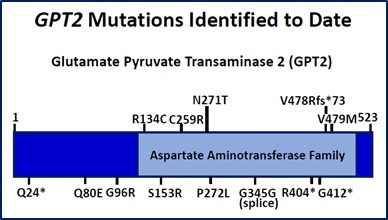The GPT2 gene is located at chromosome 16q11.2 (NCBI Gene ID: 84706). GPT2-syndrome is an autosomal recessive disorder. Mutations detected to date are located throughout the protein and are of various types – missense, nonsense, splicing. Many of the mutations are in what is termed, based on protein conservation, the aspartate aminotransferase domain, the catalytic domain (see schematic below). Some of the mutations have been detected in a homozygous state whereas others have been detected as compound heterozygous mutations. Regardless, as an autosomal recessive disorder, the mutations result in inactivation of both alleles in affected individuals. Various companies offer clinical tests, based in sequence analysis, for detection of GPT2 mutations.
GPT2 localizes to mitochondria, where it catalyzes the reversible addition of an amino group from glutamate to pyruvate, thereby yielding alanine and alpha-ketoglutarate. In vitro assays for enzyme activity and protein prediction studies suggest that many of the disease-causing GPT2 mutations detected to date, whether missense or nonsense, result in lack of enzyme activity and may affect protein folding and/or substrate binding. Studies in mice suggest deficiency of GPT2 protein (and activity) in brain may affect anaplerosis (replenishment of TCA cycle intermediates), mitochondrial metabolism, amino acid metabolism, and generation of cellular antioxidants and neuroprotective metabolites. For individuals affected by GPT2-syndrome, the location of the mutation within the GPT2 protein, as well as other factors, may affect the specific clinical phenotypes that manifest and the severity of disease.

